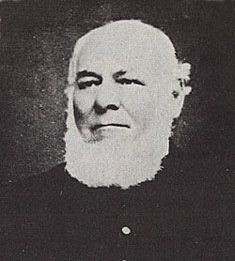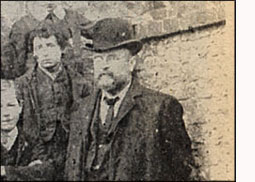 Gorsley Goff's School.
Gorsley Goff's School.
The only school in the country that still retains the name 'Goff', Gorsley School is named after a young Herefordshire farm labourer Edward Goff who despite a humble background and with little proper education became a respected and posperous Coal Merchant. Born in 1739 Edward Goff spent his early working life as a labourer. In 1764 he made the long journey to London where he managed to get a job as a clerk in a coal business, and where he began a long and profitable career in the industry.
When he died in 1813 he left part of his estate in trust to be used to establish schools for the education of poor children in Herefordshire and the adjoining counties.
In 1821 and with the help of the Goff's Trustees the Gorsley Goff's School was built using stone taken from the two quarries that existed in Gorsley at the time. In its early years the School also served as a Chapel and it was custom for the Schoolmaster to also be the Pastor.  The first Schoolmaster and Pastor appears to have been in office for 2 years although it seems there was a reluctance to record his name or his activities, one account describes him as "an awfully immoral character". He was succeeded in 1823 by Mr. John Jones who although he stayed until 1830 it was also deemed better to suppress the details of his stay rather than record them.
The first Schoolmaster and Pastor appears to have been in office for 2 years although it seems there was a reluctance to record his name or his activities, one account describes him as "an awfully immoral character". He was succeeded in 1823 by Mr. John Jones who although he stayed until 1830 it was also deemed better to suppress the details of his stay rather than record them.
In 1831 the Goff Trust sent Rev. John Hall to Gorsley and he had a far more illustrious career becoming a major figure in the establishment of the school and also played a significant role in establishing a separate Chapel in its current location. John Hall resigned from the School in 1864 bringing to an end the direct link between School and Chapel.
Throughout its early years the School had been run by mainly unqualified staff, in 1876 the first qualified teacher Mr. John Shambrook was appointed Headmaster. With his powerful personality, fearsome appearance and an attitude towards discipline that struck fear into the hearts of his pupils, Mr. Shambrook was a formidable Headmaster. His methods would no doubt be frowned upon today but there is no disputing the impact he made in the 45 years he was head of the School. In 1919 John Shambrook retired and his place was taken by Martin Wesley Warren.
With his powerful personality, fearsome appearance and an attitude towards discipline that struck fear into the hearts of his pupils, Mr. Shambrook was a formidable Headmaster. His methods would no doubt be frowned upon today but there is no disputing the impact he made in the 45 years he was head of the School. In 1919 John Shambrook retired and his place was taken by Martin Wesley Warren.
Mr. Warren served as a medical orderly in the First World War and despite suffering a wound that left him with a permanent limp he served as Headmaster for over 36 years without taking a day off through illness.  Mr. Warren guided the School through the difficult years of World War II when the number of pupils at the School increased from around 50 to over 150 with evacuees from Birmingham. Considering that the School had no mains water, electricity or toilets this must have been a trying time.
Mr. Warren guided the School through the difficult years of World War II when the number of pupils at the School increased from around 50 to over 150 with evacuees from Birmingham. Considering that the School had no mains water, electricity or toilets this must have been a trying time.
In 1955 after 6 years as Mr. Warren's deputy Mr. Stanley Witts took over as Head, at 33 years old he was the youngest head teacher in the county. Mr. Witts had served in the Royal Air Force for 6 years during the war and was a well known sportsman in Ross-on-Wye. His talents as a teacher of Physical Education and Music were to shape the future curriculum. The School soon produced football and hockey teams that could compete with the best and with gymnastics, swimming and athletics also being taught Mr. Witts was certainly ahead of his time in teaching the benefits of fitness training.
A keen musician and singer he also broadened the scope of musical education  at the School and eventually produced an orchestra that had a good deal of success at Music Festivals. Changes came to the school in 1957 with the first piped water, flush toilets followed soon after, until then the sanitation consisted of buckets that were emptied once a week. Electricity came to the School in 1960.
at the School and eventually produced an orchestra that had a good deal of success at Music Festivals. Changes came to the school in 1957 with the first piped water, flush toilets followed soon after, until then the sanitation consisted of buckets that were emptied once a week. Electricity came to the School in 1960.
Around 1980 an extra 2.5 acres of land was added to the playing fields after it was purchased from the then owners of Pound Farm. It was the prolonged efforts of Mr. Witts and the School Governors that made the re-modelling of the School possible, and work began in 1981. As the work began on the new School and after 32 years of service Mr. Witts decided to retire. He is fondly remembered and highly respected by generations of pupils of Gorsley Goff's School. Today the success of this small primary school is evident, the buildings may have changed dramatically from its early days but the ethos of the school remains the same, and Edward Goff would surely be proud of his legacy. The school now has its own web site where you can find out much more about the school today. Gorsley Goffs School web site.
